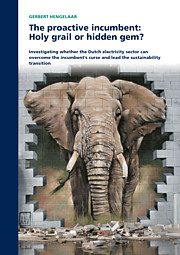The Proactive Incumbent: Holy grail or hidden gem? Defended on Friday, 1 December 2017
Why is the contribution of incumbents to sustainability transitions so heavily debated? And is it possible in practice for incumbents to pursue a proactive strategy? This thesis contributes by developing a framework to differentiate between four types of incumbent strategies and demonstrates how the proactiveness of the mindset of the incumbent’s leadership is crucial to understand the differences between them. The operationalization of the concept is made more reliable and dynamic by integrating concepts from the innovation and transitions literature. This framework is applied in the context of the Dutch electricity sector in the midst of the Energy transition. It is demonstrated that a proactive strategy by an incumbent is possible and that it improves the firm’s survival chances, can prevent costly write-downs of stranded assets, can leverage their societal relevance and impact, and can be a path to build competitive advantage.
Incumbent executives can find in this thesis an extensive argument to support the adoption of proactive strategies in key sustainability transitions. The presented case also provides a rich illustration on the tactics of proactive incumbents to facilitate transformation. For policy makers and other stakeholders this thesis provides evidence that incumbents are highly relevant actors in transitions and can make a strong positive contribution. The thesis develops tools to reliably differentiate between incumbent strategies and emphasizes that policies supporting active and proactive strategies are not the same. Finally, specific recommendations for the Electricity sector are presented
Keywords
Incumbent; transitions; proactiveness; innovation; sustainability; sustainable energy; energy transition; new business models; mindset; CSR; proactiveness








